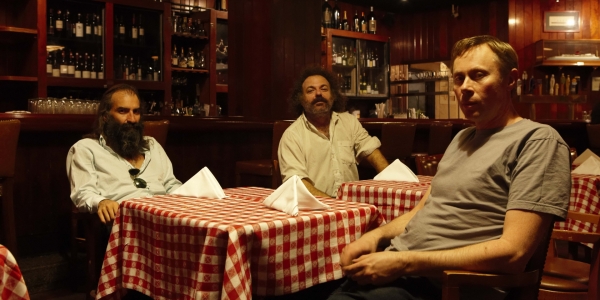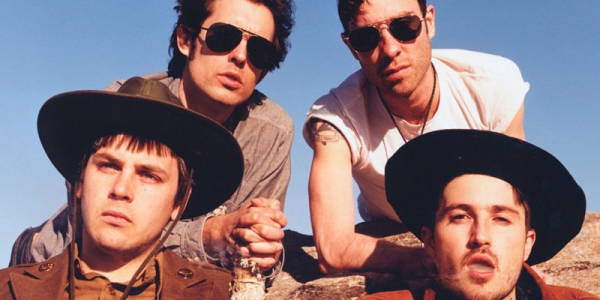My first question had been the obvious starting point: having describing Toward The Low Sun as the “definitive” Dirty Three record, I ask Ellis why he feels this is the case. Ellis politely notes that he’s been asked this question previously, and he’s already explained it was a throwaway line to include in the band’s promotional material. “I probably said in a moment of pride and jubilation that we’d finally recorded a record,” he says. “I suppose I felt like it was one of our most far-reaching and all encompassing records. There are aspects of all our albums in there – there’s the essence of each in them in the new album. I don’t really listen to our albums, but thinking about the albums we’ve recorded before, I thought we’d gone beyond what we’d done before,” Ellis says.
The challenge of making something different – even for a band such as the Dirty Three that has constructed its own unique sound – remains a difficult hurdle to get over. “As anyone who’s been in a band with a small number of members will attest, there’s a challenge in evolving,” Ellis says. “A song is just a piece with chords and melodies, and you put ‘em all together. When you have a small number of members, then the bar is higher. Horse Stories was made up in the studio – it felt like it had fallen from the sky, it was genuinely miraculous. But from then we realised we could write songs like that, and we realised that people knew we could write sad songs. And then you start to recognise after doing different projects where things are going, and you try and avoid that,” he says. “But then again AC/DC keep doing the same thing, and who cares?” Ellis laughs.
As well as the artistic challenge, the Dirty Three are hampered by logistical difficulties in getting together. With each member living in a different part of the globe, and involved in various projects, it’s problematic finding time and space to write and record together. “When we do get together, it makes those times very precious and volatile,” Ellis says. “There’s a real sense of urgency. I like the idea of going into the studio for five or six days. When it’s open-ended then you never get to the point when you’re satisfied. I like when the time’s defined. You only learn in that way. If you’re able to make decisions before it goes out, then you shouldn’t put it out,” Ellis muses.
Toward The Low Sun opens up with Furnace Skies, an instrumental blaze that provides a sharp contrast to the ensuing tracks; the song also provided a metaphor for the band’s approach to the recording process. “When we started we had this sense of ‘where’s this music going’,” Ellis says. “That track helped consolidate some ideas. It kicked it off in a chaotic and cathartic way, and helped us kick through the problem of actually making the record. That was a real breakthrough for us – there was so much freedom in there.”
It’s possible to see the titles of previous Dirty Three records as metaphorical observations on both the band’s music, and the band members’ states of mind. Ocean Songs, for example, was written and recorded at a time when the Dirty Three was touring extensively and Ellis in particular was pushing the envelope of rock’n’roll excess to close to the edge. Ellis doesn’t give any definitive insight into the meaning of Toward The Low Sun, but it’s clearly not an accidental title. “I’ve always felt like the music is indicative of the time in the Dirty Three’s life – that’s what demarcated the narrative,” Ellis says. “After we’ve recorded, we sit down and see if there are any titles lying around. Mick will usually have a painting that will indicate a theme, and we’ll often find that a title will come about from that.”
Ellis continues to live in the outer suburbs of Paris with his wife and two children. As a former school teacher in Ballarat, Ellis has a particular perspective on the French school system. “France is one of the few places where there is still faith in the state system,” Ellis says. “There’s still a real emphasis on writing, and the kids have to learn poems from age seven. There’s a reluctance to embrace new ways of teaching – the schools tend to focus on reading, writing and arithmetic.”
While Ellis makes it clear that he’s not a quest to stem the tide of progress, Ellis is concerned about the effect of society’s expectation of ubiquitous communication. “Nothing around these days teaches children to take their time – we’re not encouraging people to make decisions early and stick to them. Everything is about doing something now,” Ellis says.
The discussion segues into discourses of control, with Ellis lamenting the contemporary sociological obsession with instruction and ‘correct practice’. “What’s wrong with children having chocolate, if they have it in moderation?” Ellis muses. When I tell Ellis I have to conclude the interview to say goodnight to my own children, Ellis bids me farewell. “Go and say goodnight – and give them a bar of chocolate. Tell ‘em it’s from Warren,” he laughs.
BY PATRICK EMERY

